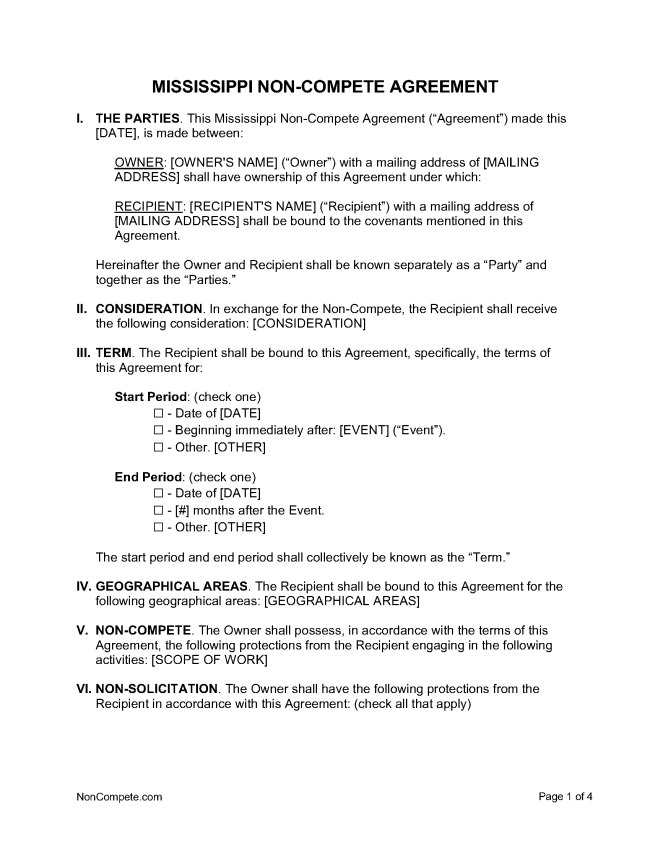A Mississippi non-compete agreement limits the type of work that a worker may do for a set period of time or in a particular geographic area. Non-compete agreements protect business investments, including relationships it has built with customers and training it provides to new employees. Compared to other states, Mississippi is relatively friendly about enforcing non-compete agreements.
Table of Contents |
Are Non-Competes Enforceable in Mississippi?
Yes, when their terms are reasonable, in particular, the:
- Amount of time the agreement lasts, and
- The geographic area the agreement covers.
Empiregas, Inc. of Kosciusko v. Bain (1992).
Reasonableness
Whether the terms of a non-compete agreement are reasonable requires balancing the interests of:
- The employer,
- The employee, and
- The public interest.
Business Communications, Inc. v. Banks (2011).
Sale of Business vs. Employment Contract
The framework for enforceability is the same for non-competes associated with the sale of a company and those associated with an employment contract. The former, however, receives less scrutiny for its reasonableness. (Cooper v. Gidden (1987)).
Geographic Reach
Geographic restrictions in non-compete agreements are usually limited to where the employer does business or has a presence. But restrictions do not necessarily need to have that relationship when the company competes in a national market.
In Timber Lake Foods, Inc. v. Estess (2011), the Court of Appeals upheld a restriction with a radius, even though it was not related to the company’s customer base, which was national. The restriction was acceptable because it balanced the ability of the former employee to find work with the employer’s interest in protecting its investment in training employees and preventing ex-employees from using relationships they had developed to poach customers.
Public Interest
For purposes of non-compete agreements, harm to public interest means that enforcing the agreement would result in services not being widely available or a monopoly being created. (Raines v. Bottrell Ins. Agency, Inc. (2008)).
Prohibited Workers
Lawyers cannot enter non-compete agreements found in employment contracts or partnership agreements, except for arrangements regarding their retirement benefits. Rule 5.6(a), Mississippi Rules of Professional Conduct.
Lawyers cannot settle cases in a manner that limits their right to practice in the future. Rule 5.6(b), Mississippi Rules of Professional Conduct.
Terminating an Employee
If an employer’s termination of an employee was done in bad faith, an otherwise valid non-compete agreement would not be enforced. (Empiregas, Inc. of Kosciusko v. Bain (1992)).
Burden of Proof
The party that wants to enforce a non-compete agreement has the burden of showing that the agreement’s terms are reasonable. (Redd Pest Control Co., Inc. v. Foster (2000)).
Continued Employment (consideration)
Continued employment is sufficient consideration to support a non-compete agreement in Mississippi. (Frierson v. Sheppard Bldg. Supply Co. (1963)).
However, if an employee is terminated from an at-will position arbitrarily or without good cause, that can remove the consideration and make the agreement unenforceable. (Empiregas, Inc. of Kosciusko v. Bain (1992)).
Maximum Term
There is no maximum term for non-compete agreements in Mississippi. However, in Business Communications, Inc. v. Banks (2011), the Court of Appeals of Mississippi, in agreeing that a two-year limitation was enforceable, reviewed many past cases and found that five years was the longest non-compete that had been upheld.
Blue Penciling (allowed)
If a portion of a non-compete agreement is unreasonable, courts can enforce it to the extent that it is reasonable.
In Redd Pest Control Co. v. Heatherly (1963), a non-compete agreement covered the entire state of Mississippi. The Mississippi Supreme Court found this unreasonable, but a restriction of a radius of 50 miles would be reasonable, and such a restriction should be enforced.
